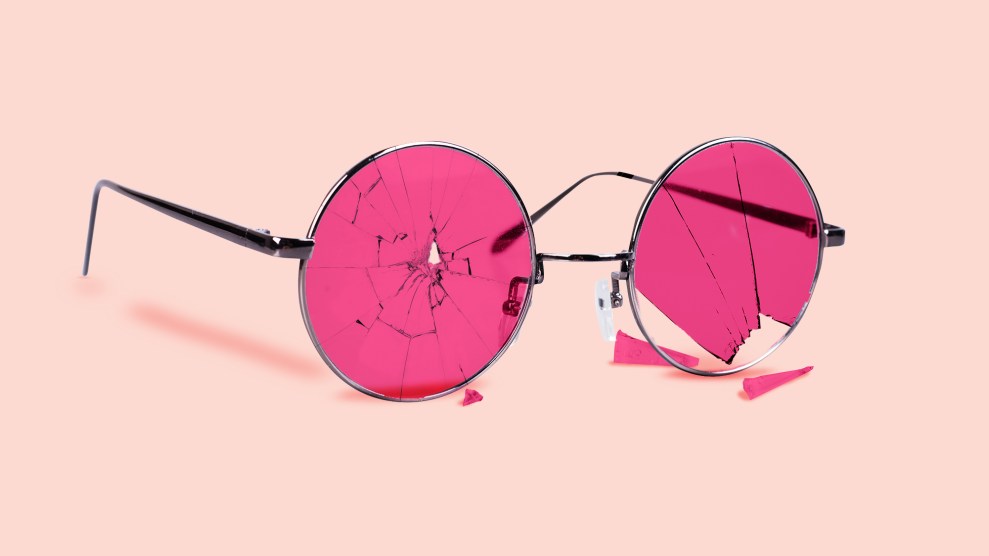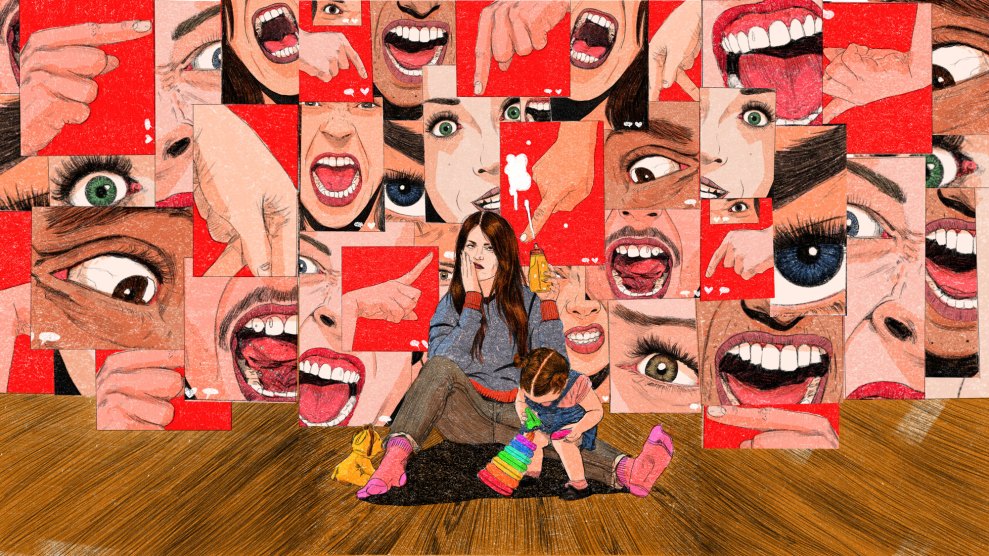
Mother Jones illustration; Getty
In White Feminism, the devil is dressed head-to-toe in direct-to-consumer clothing that was purchased because of an alluring Instagram ad, and the clothing label is probably helmed by an impossibly thin white woman who unironically refers to herself as not just CEO, but “she-e-o.” Finally, here is a book that takes on “white feminism” in a smart, productive way—defining it, dismantling it, peeling back the “you go, girl!” layers to get to the white supremacy that powers it like a poison battery. If you’re white—as I am—it can be an uncomfortable read, but that discomfort is part of the point: to force women who benefit from a privilege that comes with their skin pigment, but who believe in an inclusive feminism, to actually interrogate what that means.
In her inaugural book, Koa Beck not only thoroughly documents the history of white feminism to show how we got here, she pulls back the millennial-pink curtain on the way it supports societal hierarchies, and, of course, capitalism—think Lean In philosophy, the women’s co-working space The Wing, the idea that a morning routine of meditation and warm lemon water and a workout is the only thing standing between you, a woman, and success. This work is a love letter to feminists of color (and truly anyone who has been othered by white feminism), and Beck ends it with a thoughtful, energetic call to action to topple white feminism and build back something better. After reading it, I found myself hoping it would find its way into the hands of the liberal white feminists that I see blindly operating within a system that they are all too comfortable in, insisting all the while that they care deeply about equity and “doing the work.”
I spoke with Beck, a queer woman of mixed race who is a former editor-in-chief at Jezebel, about white women’s rage, whitewashing in feminist history, and her own experiences in the (extremely white) media world.
What is white feminism?
White feminism is an ideology, and a very specific approach to achieving gender equality that inherits its strategy from white supremacy. So this idea that you are hurtling towards the accumulation of power, which white feminism has always been on board with—more women in this position, more women in this department, more women in Congress—but there’s no real reinterpretation of that power or consideration of how to redistribute it. And that’s where white feminism really breaks from feminisms that have been led by women of color; for example, Native women’s movements, Black lesbian feminism, Chicana feminism, working-class feminism. They have always been much more interested in reinterrogating power and rethinking its distribution, which white feminism does not, it’s just about getting it. We’re definitely not thinking about domestic workers and the ways in which they’re exploited in people’s homes. We’re really only thinking about a very specific woman who is white, who is middle to upper class, who is straight, who is cisgendered, and who is economically OK. Her money squabbles are more about debilitating student loan debt, which is its own tier of systemic failure, as opposed to basic needs like food security and shelter.
For those who are unfamiliar, could you talk about your experience in media and how that narrowness of white feminism has been a barrier to anyone who doesn’t fit into it?
In terms of my own experiences, the way white feminism would often manifest is that I was hired explicitly for my background in gender and identity politics. What I would often find in my career is that I would try and propose more stories about, say, domestic workers’ rights, or how single mothers have experienced [poverty] in this country, or how the number of incarcerated women has increased, hundreds and hundreds of percentages in my lifetime, and I was told in various ways over the course of my career that those were not feminist issues.
When you were researching the book, did you encounter historical accounts and documentation that had been whitewashed? How did you parse that?
Um, yes. Historically, there has been a general media obtuseness about feminism. I tried to look up, you know, various, quote-unquote feminist responses to all types of legislation—during the Civil Rights Movement, for instance. And I would routinely come across coverage from like the 60s and the early 70s that would outline the policy, and in the second or third graf, there would always be a line that was like, feminists disapprove, or feminists reacted by doing x, and looking at the archive for guidance and how to assemble this narrative of white feminism, I look at that, and I want to know who. Steinem? Davis? And I’ve seen versions of that in contemporary media as well. I definitely see moments where there’s just a total lack of nuance surrounding different movements of feminism and different practices and ideologies, to the point where when I’m trying to piece this book together and build something that’s historically accurate, but I’m confused because of the shitty job that the journalists did 40 years before me.
Something that I think really stands out in your book is that you have very concrete recommendations for how to push past these power structures, and it made me wonder if you’ve thought about starting your own media organization?
Oh wow. Uh, no, for a lot of reasons. One, my assessment, having worked in them my entire adult career, is that something is happening in a big way to the monolithic media structure, and we cover that in a mainstream capacity, and that’s done as a sustainable business strategy. If you review the reporting that’s out there about big media companies, that bears that out exactly. I think that especially when you think of the strongest pillars of traditional women’s media, it’s often been celebrity coverage and cover stars, and that is a machine with very particular settings. And now, what is woefully apparent with social media is that if you’re one of these very big stars, you do not need that platform; you build your own platform, you shoot your own images in-house, you cultivate your own image, and that is a relationship that women’s media has always had to a culture that is now being rethought. If we’re just talking about picking up a magazine because Beyoncé is on it, Beyoncé has a constant magazine shoot on her Instagram, there is no reason to pick up that magazine. She owns those images. I think women’s media specifically has a lot to figure out in terms of monetizing their content and paying their workers appropriately and fairly, and I am not convinced from my tenure that they have figured that out. In terms of my own career, I consider myself retired from leadership positions in media. I will always write, but that is a very specific leg of my career that is now over.
This book reads as such a labor of love, and I found myself wondering about how you’re dealing with the exhaustion of explaining white feminism to a lot of white women (like me) over and over?
I deeply appreciate you asking that question. I loved researching the book; I loved writing it; I’ll get back to you on whether I love explaining it. I’m talking to a lot of women—not all of whom are white, some of whom are probably white feminists and don’t want to be—and I’m very disappointed (but not surprised) to see the defaulting to white feminism. I have written a book that critiques it, but it also shows what a lot of other movements have accomplished that do not have white feminist ideologies, roots, or practices. But the question to me is, essentially, why did you do this? And it’s the idea still, even in conversations around this book, that white feminism is the feminism. And so what I have proposed is different and not necessarily, like inherently mean, although I’m sure you know, there are people who are going to think that, but it’s disappointing to me to see how, even in the practice of understanding the book, the default mindset is that what I am proposing is, quote-unquote different. If you really talk to Black feminists, people who run queer movements, Native women’s movements, white feminism is the other.
I keep thinking about how women’s rage as a powerful political force has been a theme over the last four years, and I wondered if there was something to be made of that in the context of your critique of white feminism?
Women’s rage is a very politicized and racialized talking point. For the first Women’s March in 2017, the press covered it as nice white lady rage. [The March] was very contained, and pink pussy hats and this very recognizable sort of safe rage. I was covering it at the time with a team, and going in, I really didn’t know what to expect—Trump had just been elected. And then here we were in January, holding signs and screaming, which was very important emotionally, but also structurally. But I remember being with my wife and thinking, Wow, there’s not a lot of cops here. I would have thought there would have been a bigger police presence, given what I had been reading through December about women bussing in from all corners of the nation. And then when I got more perspective, I was like, Oh, I see, this is white lady rage. So it’s not as you know, quote-unquote, dangerous as if this was a Black Women’s March or if this was like a Latinas’ March. I think that white feminism as an ideology and a practice has been very good at positioning their rage, with inherited factors from white supremacy, as inherently safe to some extent, in a way that Black women do not have when they leave their house with signs.
What did I not ask you that I should have?
I could not have been able to assemble this book without all of the feminist writers and thinkers who wrote down their own experiences with white feminism. A big part of what I took away from young people who would ask me about white feminism directly is an obligation to write this down. I have such respect and dedication to the archives, as as an exploration of history, but also just as the thing that we will all leave behind. That’s ultimately what I came down upon when deciding to do the book—I have to write this down, I have to write down what I’ve seen, I have to make sure to record that I felt this way and that these are the bodies in place that enabled that feeling to not only continue, but also feed into this structure. I did not invent it. A lot of women have experienced white feminism. If you are interested in reading this book, I encourage you to go through the bibliography because I spent a lot of time making sure that everybody was cited appropriately and accurately. And so if you are interested in my book, you should read well beyond my book.













